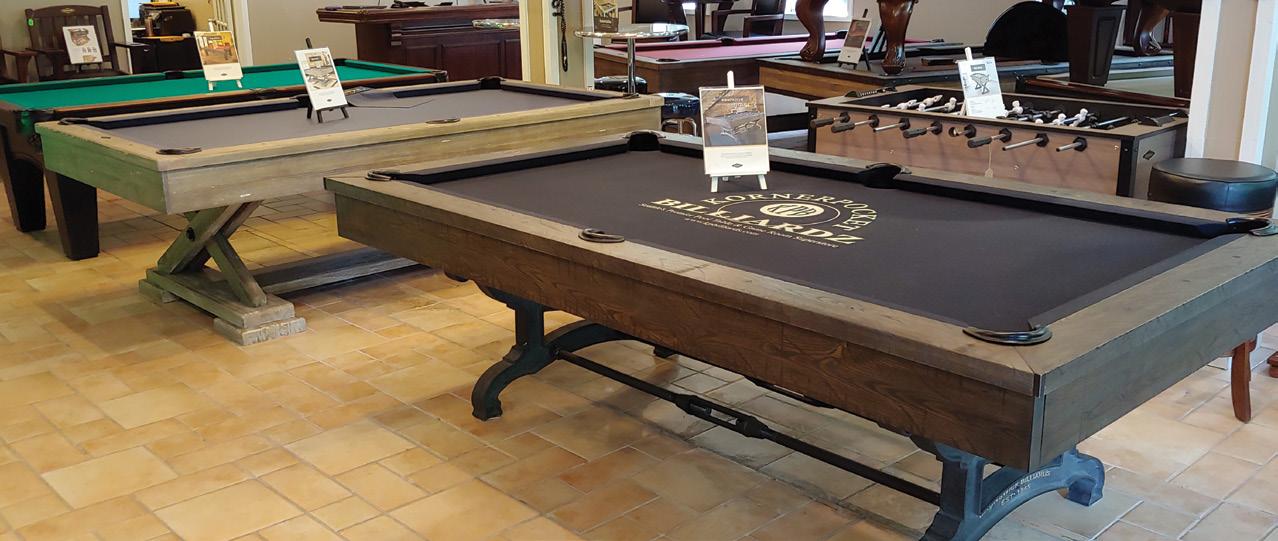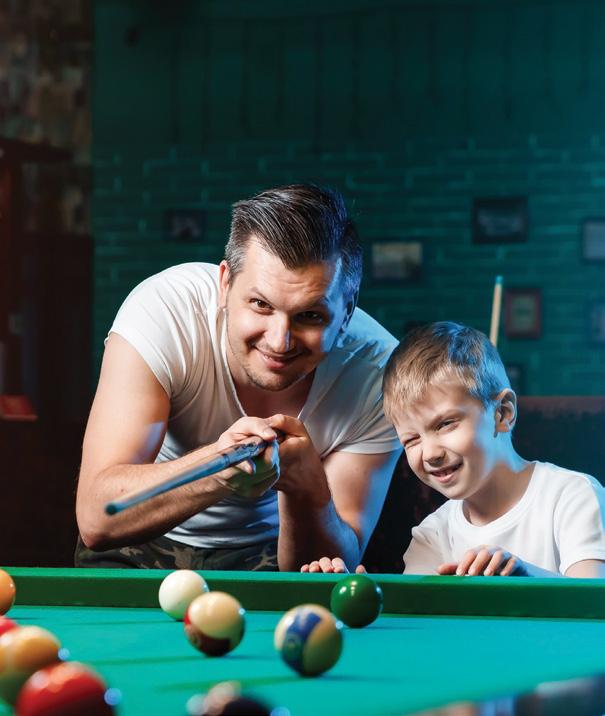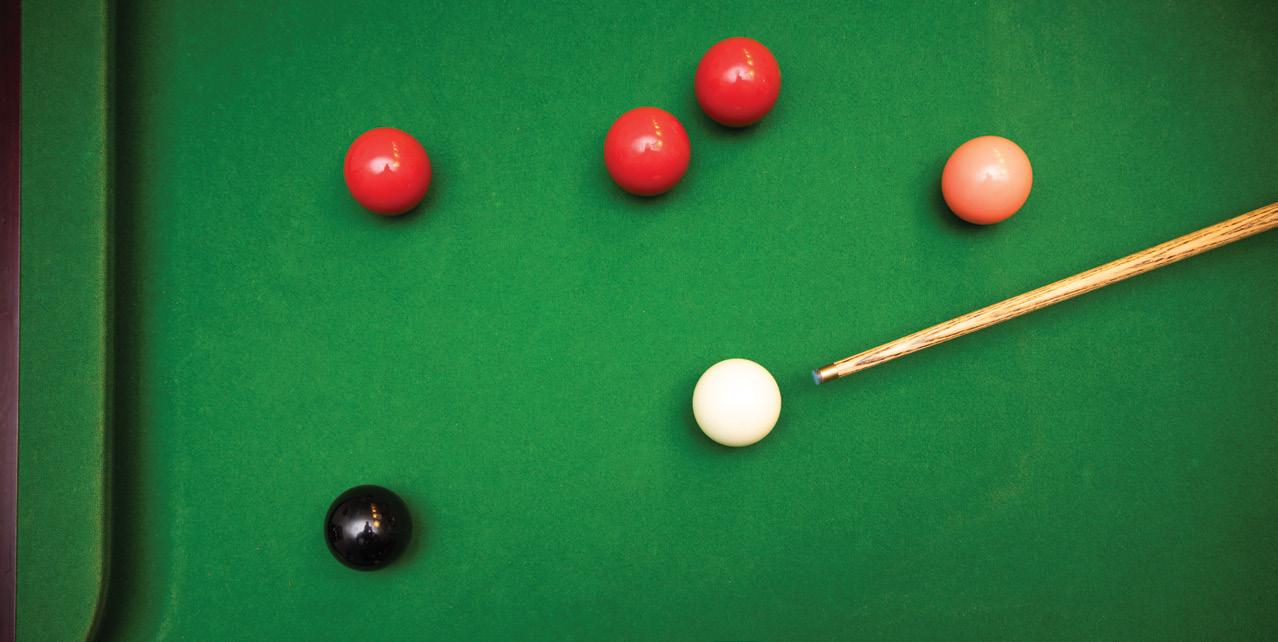
12 minute read
Virtual Lessons, Real Results
VIRTUAL LESSONS, REAL RESULTS ROY PASTOR’S ONLINE CLASSES ARE HELPING YOUNG BILLIARD STARS FROM ACROSS THE COUNTRY IMPROVE THEIR GAME
For nearly 20 years, Roy Pastor has shared his passion for pool by teaching young players how to improve their game, and many of his students have advanced to compete in some of the most prestigious tournaments in the world. Now thanks to technology, Pastor and other dedicated instructors are able to share their insight and wisdom with students from across the country through the PBIA’s Break and Run Junior Instructor Program (the PBIA is owned and operated by the BCA).
“Roy’s online pool coaching program is a great fit,” says Kan Yi, whose son, Kyle, has been taking online lessons with Pastor since 2018. “Roy utilizes Facebook Private Group, live videos and recorded videos, YouTube, Dropbox, Google Meeting – all kinds of the latest com
By Anthony Stoeckert
munication techniques to teach students online. Roy’s advice always hits the point and guides Kyle through many difficult times. The encouragement from Roy propels Kyle to get better every day.”
Pastor played pool as a kid and competed in tournaments when he was in college and during his first two years of law school at the University of Pennsylvania. After he got married, had kids and began his legal career in the early ’80s, he put pool on the back burner for 20 years.
Then, about 21 years ago, Pastor started playing the game he loves again, and he also decided he wanted to teach.
“I didn’t have any formal instruction when I was growing up,” Pastor says. “I played in boys clubs and did the things that are typical for our sport without any formal instruction.”
Pastor began his junior program, the New England Junior Billiard Training Program, at his kids’ high school. Brunswick donated two nine-foot tables and he taught there for about a year – and he even used the tables to teach physics to honor classes.
In 2002, he moved his program to the Billiards Café, an upscale pool hall in Ayer, Mass. He gave weekly instructions and ran a league, and that program is still running 19 years later.
Although he was an effective teacher, some of his students were developing very quickly, and he realized he needed to do more.
“I had a little bit of knowledge as a play- er,” Pastor says. “I was a decent collegiate player when I was younger but I didn’t really have the structure that I felt could help my students reach their full poten- tial. I could help them reach my potential, but that’s not what an instructor should be doing. I should have the tools to help my students reach their potential and hopefully that’s much greater than what I was able to reach.”
He earned certification from the PBIA Program about 15 years ago, and even- tually rose to the ranks of PBIA mas- ter instructor. His Junior program has expanded to two other locations, Weymouth Teen Center in Weymouth, where the program is run by Kathy Collins, and the Busters Billiards in Somersworth N.H., where Chris Free- man leads instruction. Both Collins and Freeman were trained by Pastor.
A NEW WAY TO TEACH
About two years ago, Walter Zincavage, a fellow PBIA master instructor, told Pastor the BCA was looking for ways to give back to the game. Pastor said that would be easy – all they needed was a program that would reach kids who don’t have resources or access to professional instructors.
“I cannot tell you how many times I’ve been to the Nationals or I’ve been to the Worlds – I’ve attended both many, many years – and I can’t tell you how many people have come up to me and said, ‘We don’t have an instructor like you near us. Our son or daughter is very motivated but we just don’t have anybody like you,’” Pastor says.
That inspired the idea for the Break and Run Junior Instruction Program, in which Pastor and other PBIA-ac- credited instructors teach students via online lessons.
“It’s really started to take off,” Pastor says. “We have a good number now of PBIA instructors who have signed on. We have students across the country and Canada, and we actually have ex- panded a little bit to help people set up curriculum and structure for ju- nior programs.”
WORKING ON SKILL SETS
Pastor and his instructors often use Facebook as a starting point, because just about everyone has it. He’ll start by having kids send a short video of them practicing, a few minutes is all he needs to get an idea of their abilities. He’ll then assign an instructor for them to participate in the Break and Run Program, with instruction tailored to each student’s skill set.
“The online program is very similar to what I do if I’m in the same room with the kids,” Pastor says. “We can also do FaceTime and other programs where it’s like you’re in the room. It’s an amazing opportunity to reach kids who normally would not have access to this instruction. It’s a great way for instructors to gain experience and it’s incredibly effective.”
It’s also free.
“The instructors donate their time,” Pastor says. “All of my physical pro- grams in New England have been free too. I don’t mind charging adults but I’ve never charged any of my kids. We have multiple national champions who have never paid a penny. I didn’t want it to be about money.”
He hosts fundraisers that help him take 10 to 15 kids a year to the BEF Junior National Championships. Considering about 250 young players compete in the tournament, that means a good
TOP: Roy Pastor MIDDLE: The 2018 Junior National Championships. Pastor surrounded by Mitchell Jiang, Tiana Jiang and Vivian Liu BOTTOM: Kyle Yi


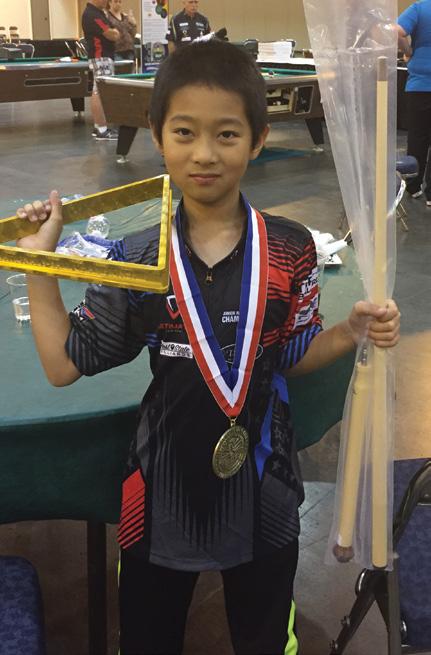
percentage of the kids there are his students, and they regularly reach the finals or finish in the top 5.
“For me it’s a lot of fun, a labor of love, but I think things like that can make a big difference in the sport,” he says.
TEACHING THE TEACHERS
Pastor is also helping other instructors become effective virtual teachers. A year ago, he was even contacted by a middle school teacher in Poland who found about Pastor’s program on Facebook.
“He said he took a three-day class to become a PBIA instructor and said, ‘But I really don’t know how to do this,’” says Pastor, who forwarded the teacher in Poland a syllabus for a year-long program.
And with COVID-19 shutting down his law office and the New England USA Pool League, which he owns, Pastor has been working on a new initiative – the American Online Pool School, which certifies instructors into the PBIA, and for which he charges.
“It is an online school which will offer multiple courses and classes with various professional instructors,” Pastor says. “One of the primary motivating factors in the development of the school was to recruit and develop qualified accredited PBIA instructors for the Break and Run program. One of the primary courses in the school is the PBIA Instructor Accreditation Course. The school offers the only PBIA online accreditation course in existence.”
PROVEN SUCCESS
Pastor’s program is renowned as one of the best in the country. Over the last six years, he has had at least two, and sometimes three, students on the American Team at the WPA World Junior Championships, and his players have competed in Cyprus, Moscow, and China in recent years. Pastor’s students, in fact, have taken home more state and national champion titles than any other junior program in the United States over the last 10 years.
And he not only teaches them, he’s also introduced many of them to billiards.
“Most of my kids who have done really well in the BEF National Championships, walked into my program without ever having picked up a pool stick,” he says. “And most of them, their parents didn’t know anything about pool.”
Among his online students is Ezra Seymour, who is 9 years old and has been taking lessons for more than a year, and his younger brother, Donovan, who is 6 and is the youngest student in the program.
Ezra and Donovan’s father, Matt, has played pool his whole life, but never competed. Matt and his wife, Eve, set up an old pool table in their home so that the family would have a fun activity to play together, and they wanted Ezra to play the game properly and found out about Pastor.
“The experience has been incredible,” Matt says. “In the span of a year, I’ve watched a beginner 8-year-old learn to dominate adult players and his goals have changed from simply holding his own with family to competing at a high national level with the long-term goal of representing the USA at the Youth World Championships in the future. Roy has been thorough in building his skill set step-by-step with patience, encouragement, and feedback on every video that we record of exercises or play.”
He adds that online lessons have provided his sons with a high level of training that would otherwise be impossible due to location and cost.
“Having videos and instructions at hand at all times allows us to review everything that we need to work on and the fact that high-level billiard people are following Ezra’s progress helps to maintain motivation which isn’t always easy with children,” Matt says. “The opportunity to have reviewed any video we record is incredible. I can’t imagine bringing in videos of Ezra’s play to an in-person instructor to review and talk about them.”
CREATING A COMMUNITY
Steve Sherman is an instructor in Pastor’s program who started playing pool when he was 13. Over the years, he has received instruction from numerous top instructors and now at 53, has been teaching for about a year and a half. He’s an active member of the billiard community, including running a website for reviewing billiard products to
LEFT:The American Team at the 2019 Worlds in Cyprus RIGHT: Roy Pastor with Vivian Liu, the current 18-andunder girls national champion, and her mom, Tong
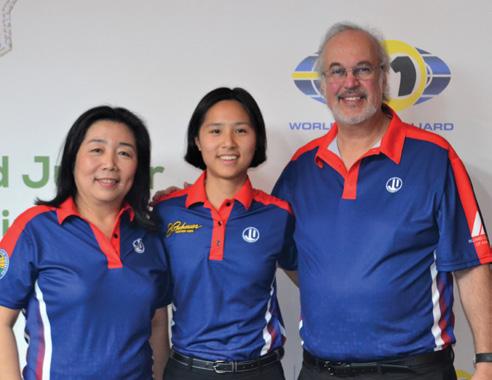


help educate players on products that can help them to improve their game.
“Billiards is very much a passion of mine,” Sherman says. “I am always looking for ways to give back to the billiard community and I receive great joy in helping others who share in that passion. I had actually been looking for ways to engage with kids to help them learn the sport at a young age so that they could grow up getting as much enjoyment from the sport as I have had. I feel that engaging with the youth is also a very important way to keep our sport growing and expanding.”
He met Pastor about a year ago, and shadowed him for a few months before taking on a student of his own.
“It was very important to Roy that every student in the program receive the same quality of training with the same techniques and disciplines,” Sherman says. “So he spent a lot of time with me, honing my skills as an instructor and providing me with the specific tools and training I would need to be successful as an instructor within the Break and Run program.”
Sherman has his own students now, and also consults with Pastor. He says teaching online has allowed him to build a strong relationship with a student.
“There really isn’t that notion of, ‘We meet on Saturday for your lesson,’” Sherman says. “It is much more fluid than that. You are always engaged. My students ask questions, post videos anytime they like. I do the same. We are in a constant process of communication and learning that is unlike anything I have ever experienced as a student myself or as an instructor.”
He adds that online teaching requires a completely different skill set than traditional instruction.
“In person, you have an opportunity to work physically with a person and to help them interactively through the process,” he says. “So for example, if someone is dropping their elbow, you can physically help adjust that in person. Being remote, you have to find unique ways to do the same things without being in physical proximity.”
He also says that online training has created a strong sense of community, as kids are sharing what they’ve learned with each other through instructional videos that they share.
“I had a 10-year-old who was having difficulty with an open bridge,” Sherman says. “It was difficult for him to relate to what I was showing him because I am an adult. But another 10-year-old in the program made a video of himself doing an open bridge, and that was all it took for my student to get it. It is a wonderful and important aspect of our online program.”
Coaches in the program have established their own community, as they watch each other’s classrooms and share advice.
“The open forums in the program really allow the kids and instructors to have fun,” he says. “Students love showing off that new skill they learned, that runout they performed, that ghost they beat. It really helps to keep them engaged and enthusiastic and makes them feel that they are part of something bigger than just a teacher-student pairing.”
Ezra Seymour

TRAINING CHAMPIONS
Pastor says his student Kyle Ye, who is 12 years old, is one of the top three boy juniors in the 14-and-under division.
Kyle’s performance backs that up. He finished first in the 2018, NEF National Junior 9-Ball Championships, 11-and-under Boys Division, second in the 2018 BCAPL World Championships Junior 8-Ball Division, and third and fourth in the Super Billiard Expo Junior 12-and-under Division.
“The online coaching from Roy is fantastic,” says Kyle’s father, Kan. “Kyle won national championships, yet his fundamentals needed to be rebuilt, that’s exactly how Roy started to help Kyle. Started from grip, elbow, stance, stepping in, alignment, speed control all these essential techniques. Roy has totally reshaped Kyle into an amazing junior player, with all the possibility to reach his potential. 2018 is a lucky year for Kyle, not just because he won the National, but also because he met a most respected and prestigious coach in the country to teach him.”
For more on the Break and Run program, including how to sign on to the program, go to playbetterbilliards. com/jr-instruction. Instructors who would like more information on Roy Pastor’s American Pool School can go to www.americanpoolschool.com.
CENTENNIAL

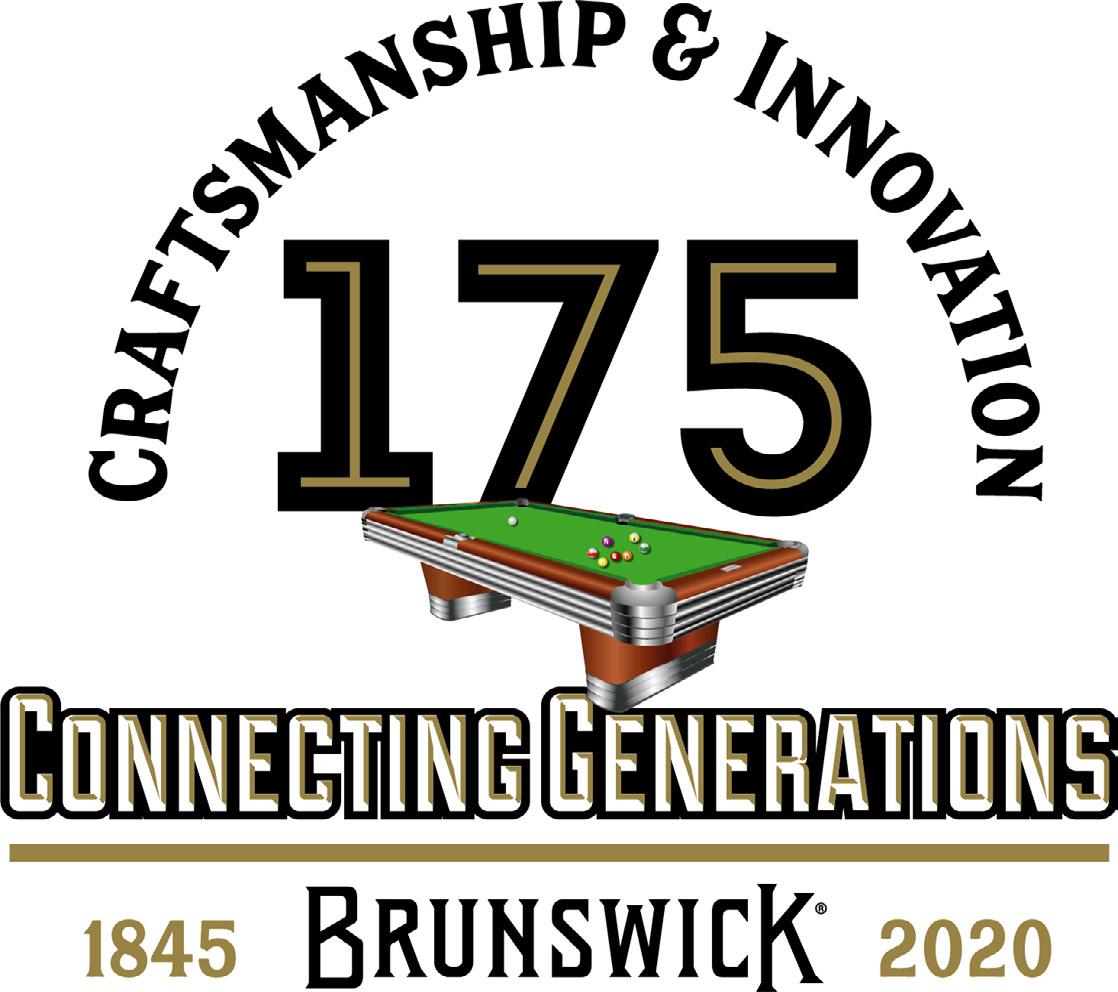
NEW FOR 2020

THE HENDERSON

EQUINOX



